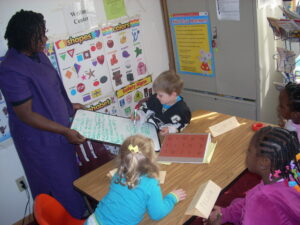By: Maya Fanjul-Debnam
 From the moment they are born, children are learning from their surroundings. Everything from brain growth to approaches to life are shaped by what does—or does not–happen in their first months and years of life.
From the moment they are born, children are learning from their surroundings. Everything from brain growth to approaches to life are shaped by what does—or does not–happen in their first months and years of life.
As highlighted in a study from the Ounce:
“Early experiences that are nurturing, active, and challenging actually thicken the cortex of an infant’s brain, creating a brain with more extensive and sophisticated neuron structures that
determine intelligence and behavior.”
Research shows that children who are exposed to fewer colors, less touch, limited interactions with adults, fewer sights and sounds and less language actually have smaller brains.
So, how can we stop this?
High-quality infant-toddler child care before the child enters preschool is the best way to guarantee the child receives the nurturing their brain needs, according to research. These quality early education programs make a tangible difference in a child’s life, which is why Think Small works to ensure every Minnesota child receives the early education opportunities they deserve.
What are the components of a quality early learning program?
Programs need:
- Developmentally appropriate curriculum.
- Enriching, engaging, and safe environment.
- Experienced teachers.
- Small group sizes and low adult to child ratios.
- Parent-teacher communication and family engagement.
- A cohesive school community with connections to the larger community.
A study conducted by the University of Minnesota found that:
“In 2014, 4 percent of children under age 5 were served by early intervention or early childhood special education services statewide, reaching from 1 to 11 percent of children per county.”
Think Small is making strides in helping Minnesotan children receive those crucial early learning programs, but there are still children in need who don’t have access to them. Over 200,000 children in Minnesota have both parents working outside the home, meaning they need quality full-time child care.
Learning starts at birth. Age 4 or 5 is too late for many children. Child care programs offer a unique opportunity to reach children and families where they already are- in care- during a time that children can be the most impacted by their surroundings.








